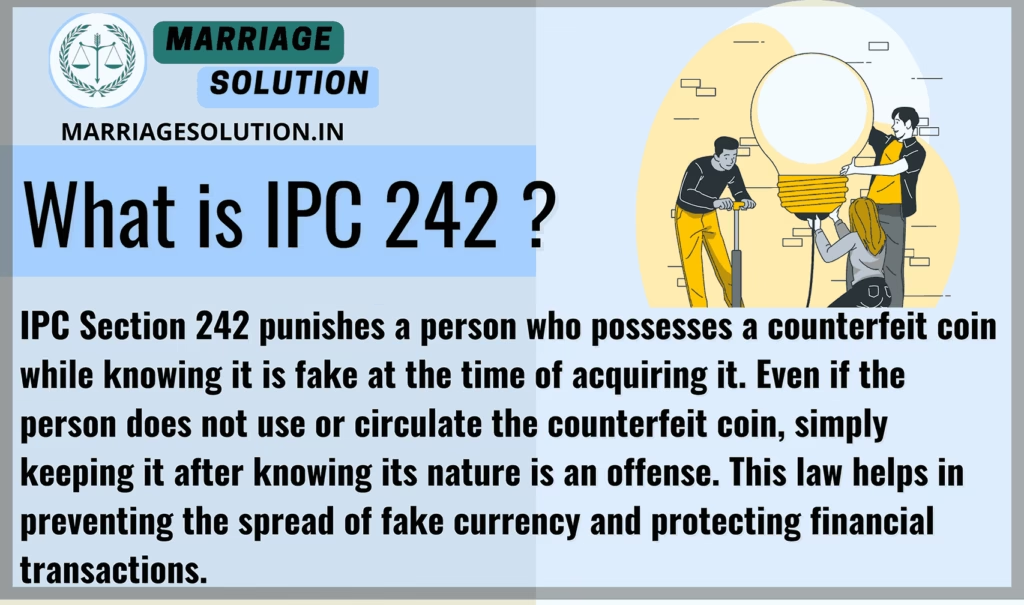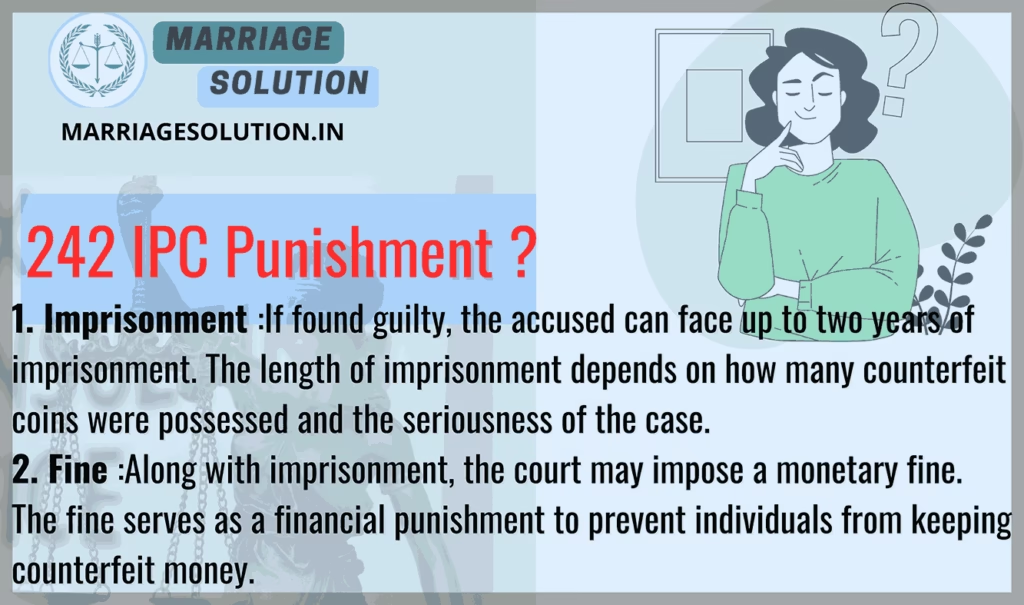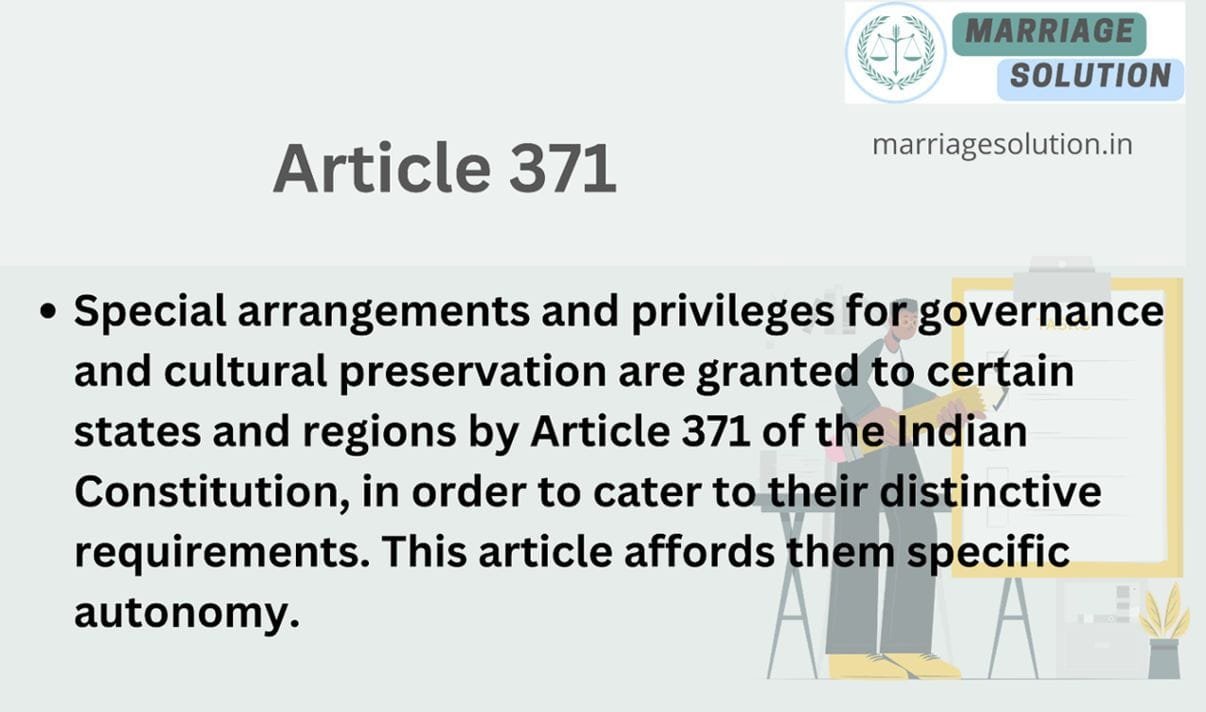Introduction of 242 IPC
This section of the Indian Penal Code deals with a person who possesses a counterfeit coin while knowing it is fake. The law punishes those who knowingly keep counterfeit coins because it prevents fraud and dishonesty in financial transactions. The objective of this law is to stop the circulation of fake currency and protect the economy.
- Introduction of 242 IPC
- What is IPC Section 242 ?
- Section 242 IPC in Simple Points
- Section 242 IPC Overview
- 10 Key Points of IPC 242
- 1. Possession of a Counterfeit Coin with Knowledge
- 2. Preventing the Spread of Fake Currency
- 3. No Need to Prove Intent to Use
- 4. Punishment Under IPC 242
- 5. Role of Law Enforcement in Detecting Counterfeit Coins
- 6. Connection to Counterfeit Currency Networks
- 7. How Courts Determine Knowledge of Counterfeit Coins
- 8. Difference Between IPC 242 and Other Counterfeiting Laws
- 9. Public Awareness and Responsibility
- 10. Protecting the Economy and Public Trust in Currency
- Example 1: A Shopkeeper Keeping Fake Coins Intentionally
- Example 2: A Person Accepting a Fake Coin and Keeping It
- 10 Key Points of IPC 242
- Section 242 IPC case laws
- 242 IPC Punishment
- 242 IPC Bailable or non bailable
- Section 242 IPC in short information
- IPC Section 242 FAQs
- If you need support with court proceedings or any other legal matters, don’t hesitate to reach out for assistance.
What is IPC Section 242 ?
IPC Section 242 punishes a person who possesses a counterfeit coin while knowing it is fake at the time of acquiring it. Even if the person does not use or circulate the counterfeit coin, simply keeping it after knowing its nature is an offense. This law helps in preventing the spread of fake currency and protecting financial transactions.

Section 242 IPC in Simple Points
1. Possession with Knowledge is a Crime
Under IPC 242, a person is guilty only if they knew the coin was counterfeit when they received it. If someone unknowingly gets a fake coin but later discovers its nature, they must report it or dispose of it properly. Keeping a counterfeit coin knowingly raises suspicion that the person intends to use it fraudulently. The law prevents individuals from hoarding or saving fake coins for future illegal use.
2. Preventing Circulation of Counterfeit Money
The main purpose of IPC 242 is to stop fake currency from entering the economy. If counterfeit money is allowed to remain in people’s possession, there is always a risk that it might be used in transactions. This could harm businesses and individuals who unknowingly accept such money. By punishing mere possession, the law discourages people from storing fake coins for later use.
3. No Need to Prove Intention to Use
Unlike other counterfeiting laws, IPC 242 does not require proof that the person planned to use the fake coin. Even if they never try to spend or exchange it, simply keeping a counterfeit coin knowingly is an offense. This is because allowing people to keep fake currency increases the chances of it being misused later.
4. Punishment Under IPC 242
A person convicted under IPC 242 can face up to two years of imprisonment, a fine, or both. The punishment depends on the seriousness of the offense, such as the number of counterfeit coins possessed and whether the person has committed similar offenses before. The fine is intended to deter people from keeping counterfeit money and ensure that they do not benefit from it financially.
5. Law Enforcement and Detection
Police and other agencies actively investigate cases of counterfeit currency. If someone is found with a fake coin, the police will try to determine whether they knew it was counterfeit when they got it. If a person has a large number of counterfeit coins, it strengthens the case against them. Authorities also educate people on how to detect fake currency and report it instead of keeping it.
Section 242 IPC Overview
IPC 242 is an important legal provision that prevents the circulation of counterfeit currency by punishing those who knowingly keep it. The law ensures that people do not store, hide, or attempt to use fake coins, thereby protecting financial transactions and maintaining trust in genuine currency. By penalizing possession itself, this law acts as a strong deterrent against financial fraud and helps law enforcement track down counterfeit currency networks.
10 Key Points of IPC 242
1. Possession of a Counterfeit Coin with Knowledge
This section applies only when a person already knows that the coin is counterfeit at the time they receive it. If someone unknowingly receives a fake coin, they are not guilty under this section unless they continue to keep it after discovering the truth. The law assumes that anyone who knowingly keeps a fake coin has the intention to use or circulate it. If such coins are allowed to stay in circulation, they could cause financial losses to businesses and individuals. The law ensures that people do not store, hide, or keep fake currency for future use.
2. Preventing the Spread of Fake Currency
The main goal of this section is to stop the spread of counterfeit money in the economy. If people are allowed to keep counterfeit coins, they may later use them in transactions to deceive others. By criminalizing possession, the law ensures that fake money is removed from circulation as soon as it is identified. It also discourages people from accepting such coins in the first place. The circulation of counterfeit money reduces public trust in currency and can have serious economic consequences.
3. No Need to Prove Intent to Use
Unlike other sections of the IPC that deal with counterfeiting, IPC 242 does not require proof that the person intended to use or circulate the counterfeit coin. Even if they never attempt to spend or exchange it, simply keeping the fake coin knowingly is enough to be punished. This is because the risk of fraudulent use remains as long as the counterfeit money is in possession. The law assumes that knowingly keeping such coins is a step toward their potential use, which is why possession itself is a crime.
4. Punishment Under IPC 242
If a person is found guilty under IPC 242, they can be punished with imprisonment for up to two years. Additionally, they may be fined, or both imprisonment and fine can be imposed. The severity of the punishment depends on factors such as the number of counterfeit coins possessed and whether the person has a past record of involvement in similar offenses. The fine imposed is meant to act as a financial deterrent and discourage the possession of fake currency. The law ensures that people do not profit from keeping or storing counterfeit money.
5. Role of Law Enforcement in Detecting Counterfeit Coins
Police and other investigative agencies play a crucial role in tracking counterfeit money and preventing its spread. To prove an offense under IPC 242, investigators must show that the accused knew the coin was fake when they received it. They do this by checking where the coin was found, how it was acquired, and the statements of the accused. If a person has a large number of counterfeit coins, it becomes strong evidence that they were aware of their nature. Law enforcement also educates people on how to identify fake currency and report it.
6. Connection to Counterfeit Currency Networks
Many counterfeit coins come from organized criminal groups that distribute them through illegal channels. Some people knowingly store fake coins for such criminals, waiting for the right time to use them. IPC 242 helps break these networks by punishing those who possess counterfeit money, even if they are not directly involved in making or distributing it. The law ensures that people do not assist counterfeiters by keeping fake currency safe for them. By targeting possession, authorities can trace the source of counterfeit money and take action against larger criminal groups.
7. How Courts Determine Knowledge of Counterfeit Coins
To convict someone under IPC 242, the court must prove that the person knew the coin was fake when they got it. If a person unknowingly receives a counterfeit coin and later finds out, they should report it instead of keeping or using it. Courts look at evidence such as where the coin was found, how it was stored, and the accused’s past actions. If someone tries to hide the counterfeit money, it is seen as a sign that they knew it was fake. A large quantity of counterfeit coins further strengthens the case against the accused.
8. Difference Between IPC 242 and Other Counterfeiting Laws
IPC 242 is different from IPC 239 and IPC 240, which deal with delivering or attempting to use counterfeit coins. IPC 242 focuses only on possession with knowledge. A person can be punished even if they do not use or try to exchange the counterfeit coin. This law ensures that counterfeit money does not remain in circulation by stopping its storage and possession. It acts as a preventive measure against fraud, ensuring that people do not keep fake currency with the intention of using it later.
9. Public Awareness and Responsibility
It is important for people to be aware of how to identify counterfeit coins. If someone suspects they have received a fake coin, they should report it to authorities instead of keeping or using it. Keeping counterfeit money knowingly is a punishable offense under IPC 242. Public awareness campaigns help educate people on identifying fake currency and reporting it to banks or police. By being vigilant, individuals can help reduce the circulation of counterfeit coins and protect the economy.
10. Protecting the Economy and Public Trust in Currency
Fake currency harms the economy by reducing trust in genuine money and causing financial losses. IPC 242 helps in preventing economic fraud by ensuring that counterfeit coins do not remain in possession of individuals who might use them later. By punishing those who knowingly keep counterfeit money, the law helps to safeguard businesses and individuals from financial deception. It also supports efforts by banks and financial institutions to detect and remove counterfeit currency from circulation.
Example 1: A Shopkeeper Keeping Fake Coins Intentionally
Ramesh is a shopkeeper. One day, a customer pays him with a ₹10 coin. Later, Ramesh realizes that the coin is counterfeit. Instead of reporting it or disposing of it, he decides to keep it and later use it to buy goods.
A police raid in the market leads to the discovery of counterfeit coins in circulation. During an investigation, the police find Ramesh possessing multiple counterfeit coins, and he admits that he knew they were fake when he got them. Ramesh is charged under IPC 242 for knowingly possessing counterfeit coins, even though he did not directly make or distribute them.
Example 2: A Person Accepting a Fake Coin and Keeping It
Neha, a college student, receives a ₹5 coin as change from a bus conductor. Later, her friend tells her that the coin is counterfeit. Instead of returning or reporting it, Neha keeps the coin in her wallet, planning to use it later.
During a routine security check at a shopping mall, authorities find counterfeit coins in Neha’s possession. She admits that she knew the coin was fake when she got it but still kept it. She is charged under IPC 242 because even though she did not create the fake coin, she knowingly kept it, which is illegal.
Section 242 IPC case laws
1. Case: State vs. Ramesh Kumar (2021)
- Facts: The accused was found with ten counterfeit coins and admitted he knew they were fake.
- Result: The court sentenced him to one year of imprisonment and a fine of ₹5,000.
2. Case: Rajesh Verma vs. State (2018)
- Facts: A businessman was caught hoarding counterfeit coins with the intent of exchanging them.
- Result: The court imposed a fine of ₹10,000 and six months of imprisonment.
3. Case: Police vs. Anil Sharma (2015)
- Facts: The accused accepted a counterfeit coin in a shop and continued to use it despite knowing it was fake.
- Result: He was sentenced to one year of imprisonment.
4. Case: State vs. Manish Gupta (2020)
- Facts: The accused found counterfeit coins but did not report them to the police.
- Result: The court imposed a ₹2,000 fine and a six-month jail sentence.
5. Case: Rakesh Singh vs. State (2017)
- Facts: A trader received fake coins and knowingly kept them instead of reporting them.
- Result: He was given a two-year prison sentence and a fine of ₹15,000.
242 IPC Punishment
1. Imprisonment
If found guilty, the accused can face up to two years of imprisonment. The length of imprisonment depends on how many counterfeit coins were possessed and the seriousness of the case.
2. Fine
Along with imprisonment, the court may impose a monetary fine. The fine serves as a financial punishment to prevent individuals from keeping counterfeit money.

242 IPC Bailable or non bailable
IPC 242 is a bailable offense. This means that the accused can seek bail and avoid being kept in custody until trial. However, bail is granted based on the facts of the case and whether the accused is likely to misuse the bail.
Section 242 IPC in short information
| IPC Section | Offense | Punishment | Bailable/Non-Bailable | Cognizable/Non-Cognizable | Trial By |
|---|---|---|---|---|---|
| IPC 242 | Possession of counterfeit coin with knowledge | Up to 2 years of imprisonment, fine, or both | Bailable | Non-Cognizable | Magistrate |
IPC Section 242 FAQs
What happens if I unknowingly receive a counterfeit coin?
Does IPC 242 apply to counterfeit paper money?
If you unknowingly receive a counterfeit coin, you are not guilty under IPC 242. However, if you later find out and still keep it, you can be punished under this law.
Can I be arrested under IPC 242?
Yes, but since IPC 242 is bailable, you can seek bail if arrested.
How can I avoid violating IPC 242?
If you suspect a coin is counterfeit, report it to the police or the nearest bank instead of keeping it.
Does IPC 242 apply to counterfeit paper money?
No, IPC 242 only applies to counterfeit coins. Counterfeit banknotes are covered under different sections of the IPC.
Is IPC 242 a serious offense?
Yes, because possession of counterfeit money can lead to economic fraud, even if it seems minor.
If you need support with court proceedings or any other legal matters, don’t hesitate to reach out for assistance.
Court or any other marriage-related issues, our https://marriagesolution.in/lawyer-help-1/ website may prove helpful. By completing our enquiry form and submitting it online, we can provide customized guidance to navigate through the process.
Right to Information RTI act :Your Comprehensive Guide (Part 1)
The Right to Information (RTI) Act : Explore the essence of the Right to Information (RTI) Act through this symbolic image. The image features legal documents, emphasizing the importance of transparency and accountability in governance. The scales of justice represent…
What is Article 371 of Indian Constitution ?
Article 371 of the Indian Constitution grants special provisions to specific states and regions within India, addressing their unique historical, social, and cultural circumstances. These provisions aim to accommodate diverse needs and protect cultural identities within the constitutional framework.
Indian Labour law : Your Comprehensive Guide (Part 1)
The purpose of labour laws is to safeguard employees and guarantee equitable treatment at the workplace, encompassing aspects such as remuneration, security, and perks. These regulations establish a secure ambiance by imposing minimum wage requirements, ensuring factory safety measures are…
GST :Your Comprehensive Guide (Part 1 – Understanding the Basics)
The Goods and Services Tax (GST) is like a big change in how we pay taxes in India. It started on July 1, 2017, and it’s here to simplify things. Before GST, we had many different taxes, and it could…





